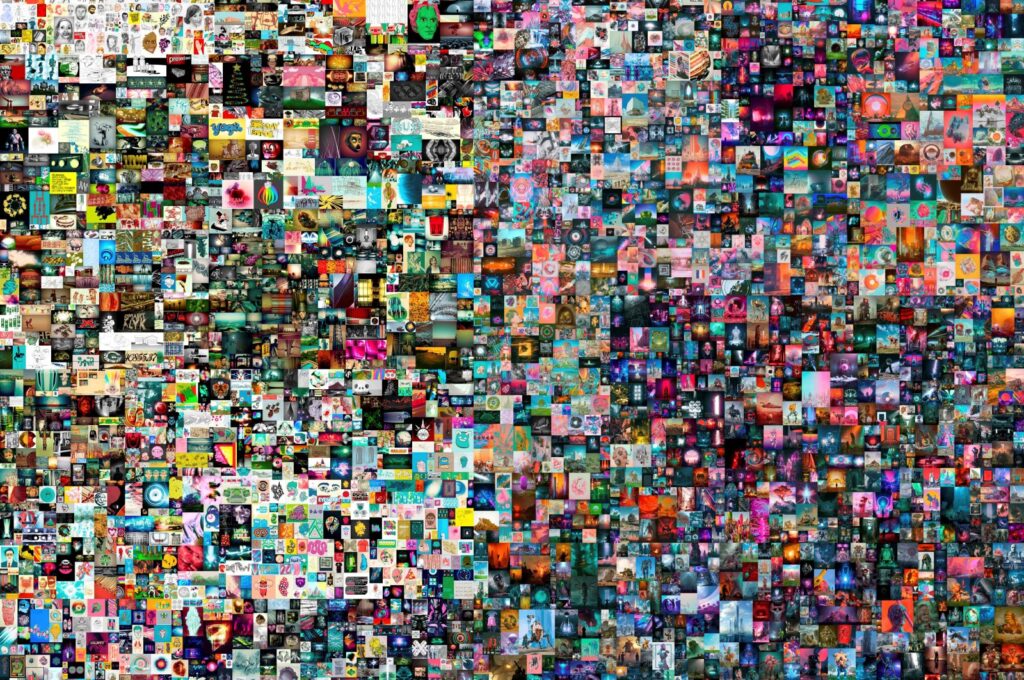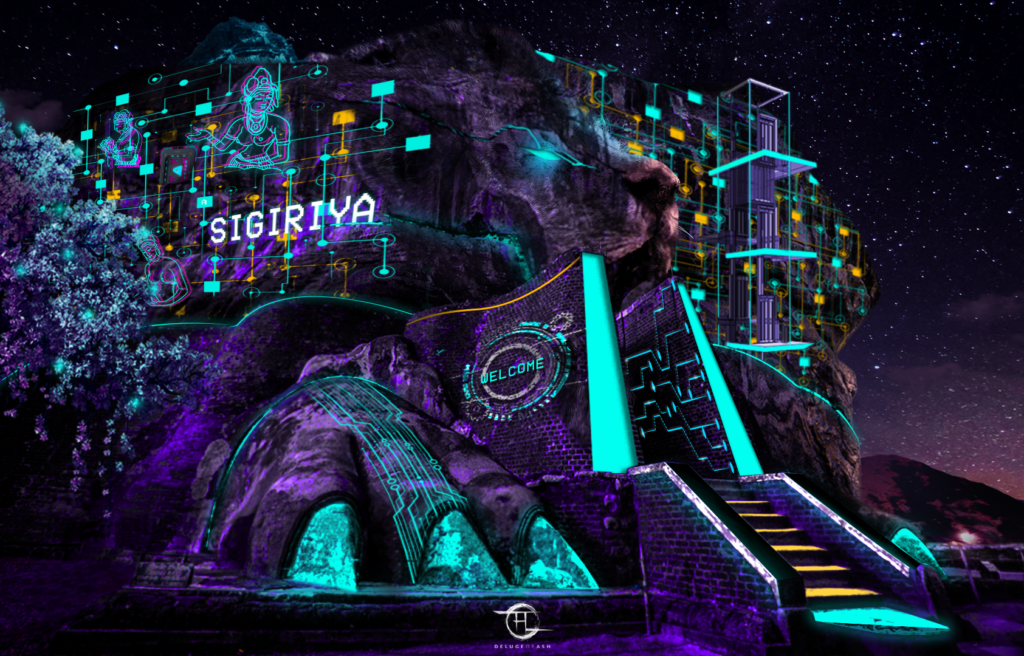Digital art piece sells for $69 million in an auction

“Everydays– The First 5000 Days,” by the artist called Beeple, established a record for digital artwork in a sale at Christie’s. After a flurry of 180 bids in the last hr, a JPG file was sold in an online auction for $69.3 million. The price was a brand-new high for an artwork that exists just digitally. The sale sets Beeple amongst the leading 3 most valuable living artists, according to the auction house. Each new evolution in technology poses one key question, who will identify its value first and reap the greatest reward, and who will scramble to catch up before it’s too late? NFTs mean that digital art has better economics for artists. in the long run, this could make digital art a bigger market than the $60 billion physical art market. An increasing number of people worldwide are migrating toward NFT’s with interest around it growing rapidly. But what exactly is an NFT?
NFT represents a “non-fungible token” which is a unique kind of token that stands for something unique. The very best analogy I have read originates from Lance Koonce and Sean Sullivan of Davis Wright Tremaine, who explain NFTs as being index cards that give information about books stored in a library. Similar to a book, the artwork “lives” elsewhere: the NFT is a document of it, but not the thing itself. NFTs can revolutionize the marketplace because they secure ownership of an intangible article, which can then be bought and sold. So creating a secondhand market and possibly bypassing the conventional framework of the marketplace as well as its gatekeepers. Their buyers represent a new cohort for the art market — only three of the 33 bidders on the Beeple, for instance, were previously known to Christie’s, and 91 per cent were millennials (born 1981-96) or Gen X (1965-80).
Digital works do not need exhibiting, transportation, insuring, and so on. Nevertheless, developing and also offering them is extremely energy-heavy: the Beeple sale consumed enough electrical power to power more than 13 homes for a year. The number of possible usage instances for a NFT continues to expand with time, and ever more innovative examples appear regularly. NFT can represent any class of digital property. Nevertheless, there are a handful of popular use situations, such as in-game properties, trading cards/collectibles, virtual real-estate (lands), domains, and works of art.
With NFTs, anything you buy in a game is yours. Each possession is distinctively identifiable, can have a provable limited number of copies, and can be transferred between users, without asking the consent of the developer. Even better, it can additionally be moved outside the game, but available for sale on a marketplace or even used inside another game, supplying additional utility as well as gameplay throughout different video games. Blockchain in gaming, as well as NFTs, replicate the physical world.
Ethereum is the tech that powers the cryptocurrency ether – and the hysteria about NFTs is booming the market for currencies. The cost of minting an NFT entails costs (called “gas”) which can differ from a few bucks to about $100 on Ethereum, typically payable in cryptocurrency. With the hype regarding this sudden potential gold mine and every person minting NFTs, this is most likely pressing the currency even higher. For the moment some issues still need resolving with this technology. Most likely one of the most important is that of copyright and also possession: the customer of the NFT requires to be sure that the work being purchased does belong to the developer. There have already been manifold frauds, with fraudsters copying artists’ works and minting and selling as NFTs.
In some ways, digital art is superior to physical art. Digital art is the next evolution of physical art. Each piece can incorporate complex movement into the art. A single screen on a wall surface can periodically cycle through different pieces of art at the predetermined direction of the homeowner or art collector. Digital art can be sent to anyone in the world with a few clicks, it is immune from damage, and authenticity and transparently is available for anyone to verify. A key attribute of digital art is that – since it can be tracked using the blockchain, digital art enables the artist to capture value as works appreciate. After that, there is the question of what happens if the system that holds the digital artwork merely vanishes. This is not a fanciful circumstance: if the platform that hosts the digital work you bought goes bust, your work simply disappears, just like that — and the NFT will be “empty”.
CryptoKitties & NBA Topshot
Any conversation regarding non-fungible tokens needs to begin with a discussion connecting CryptoKitties. In 2017, CryptoKitties introduced as a game built on the Ethereum blockchain that allows you to buy, sell, and breed digital felines. People were willing to pay huge dollars for CryptoKitties since the game made use of non-fungible tokens. Each token stood for a special pet cat and also included identifiable information embedded in a smart contract. To put it simply, when you bought a cat, that feline was yours and you could prove your ownership.
Early models of the blockchain had been fungible. Bitcoin, as an example, is a fungible token because each Bitcoin is interchangeable with another Bitcoin. In the real world, cash is a fungible good since any kind of dollar bill can be traded for any other dollar bill. CryptoKitties and NFTs were a big deal because for the first time, certifiable and also authenticated digital ownership was possible.
This meant that NFTs solved a unique issue for digital artists. Before NFTs, the artist could not safeguard their digital art since it could be conveniently duplicated. Yet with NFTs, a customer might purchase an item of digital art and know that she owned the real work; on the other side of the transaction, the artist could sell and trace her piece using blockchain technology. Marketplaces like SuperRare, Foundation, and Nifty Gateway (currently owned by the Winklevoss twins) emerged to connect digital artists with customers. These websites both run online auctions and also list featured artworks.
Perhaps the most intriguing example is NBA Topshot, a project from Dapper Labs that allows super fans to “own the best moments from NBA history.” One LeBron James dunk, for example, sold for $71,455.
The Metaverse
At its simplest, the metaverse is a shared digital space. The word “metaverse” first emerged in Neal Stephenson’s 1992 sci-fi classic Snow Crash, used to describe a multiplayer virtual world. NFTs are critical to the metaverse because they make it possible for digital ownership. Not only can you have digital art in the metaverse, you can own a digital home to hang that art in. Because NFTs are linked on the Ethereum Blockchain, they are immutable and irreplaceable; no person can refute your possession of that art or that residence.
The metaverse will have a robust virtual economy, and NFTs are the foundation for this economy. Digital transactions are already mainstream: microtransactions have expanded from 20% of gaming revenue in 2010 to 75% of gaming revenue in 2020. By 2025 in just four years they’ll make up 95% of gaming revenue.
Takeaways

Blockchain-certified computer files are also being utilized to market and monetize an ever-widening range of cultural, commercial, and personal items, in what some have likened to a digital gold rush.
“Sigiriya, 2077” is a digital art by Deluge of Ash – It’s to be auctioned on the 24th of May and is possibly the very first NFT Auction to be held in Sri Lanka. This cyberpunk art approach to the ancient “Lion Rock” fortress capitalizes on the rising interest in NFT’s, and someone surely would be going home with a part of Sri Lankan digital art history.
Jack Dorsey, the co-founder, and chief executive of Twitter marketed his very first tweet as an NFT in a timed charity auction. After it spent over two weeks on the market, his first tweet sold for a weirdly specific number of $2,915,835.47. The winning prospective buyer was Sina Estavi, that had held the highest bid since offering $2.5 million on March 6th.
And in the world of music, where a combination of digitalization and pandemic cancellations has diminished performers’ earning power, NFTs are creating income sources. The rock band “Kings of Leon” was the first group to launch an album as a series of digital tokens.
Digital art, NFTs, and the metaverse are a one-of-a-kind convergence of trends: the creator economy, cryptocurrencies, virtual worlds, business model innovation, online communities. The future of the net is social, creative, and self-expressive, and these topics embody that future. Digital artists personify a new career enabled by the internet – one that may be more lucrative than its physical counterpart.
Lest now address the elephant in the room “Why don’t people just right-click on an image instead and save it to their desktop?” It’s free – why pay millions to own one? But this misses the point: why does physical art have value? Because we assign it value. The same can be said for virtually anything. NFT’s also provide a unique connection to the creator that does not exist with any other art form. Like every other collectible, whether it’s baseball cards, rare books, or fine art, having an original is special. To be clear, there’s could be no visual difference between an original and a copied version.
- Written by: Mohenesh Chamith Buthgumwa
- Posted on: May 20, 2021
- Tags: "Everydays-- The First 5000 Days, beeple, blockchain, deluge of ash, digital marketing sri lanka, gas, NFT, non fungible token, sigiriya 2077